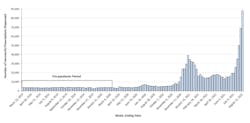CDC warns of severe illness associated with use of products containing ivermectin to prevent or treat COVID-19
The Centers for Disease Control and Prevention (CDC) confirmed, along with the American Association of Poison Control Centers (AAPCC), that human exposures and adverse effects associated with ivermectin reported to poison control centers have increased in 2021 compared to the pre-pandemic baseline. These reports include increased use of veterinary products not meant for human consumption. The CDC has cautioned about the potential risks of use for prevention or treatment of COVID-19, in a release.
Ivermectin is not authorized or approved by the U.S. Food and Drug Administration (FDA) for prevention or treatment of COVID-19. The National Institutes of Health’s (NIH) COVID-19 Treatment Guidelines Panel has also determined that there are currently insufficient data to recommend ivermectin for treatment of COVID-19.
Adverse effects associated with ivermectin misuse and overdose are increasing, as shown by a rise in calls to poison control centers reporting overdoses and more people experiencing adverse effects.
Ivermectin is a medication that is approved by FDA in oral formulations to treat onchocerciasis (river blindness) and intestinal strongyloidiasis. Topical formulations are used to treat head lice and rosacea. Ivermectin is also used in veterinary applications to prevent or treat internal and external parasitic infections in animals. When used in appropriate doses for approved indications, ivermectin is generally well tolerated.
Clinical trials and observational studies to evaluate the use of ivermectin to prevent and treat COVID-19 in humans have yielded insufficient evidence for the NIH COVID-19 Treatment Guidelines Panel to recommend its use. Data from adequately sized, well-designed and well-conducted clinical trials are needed to provide more specific, evidence-based guidance on the role of ivermectin in the treatment of COVID-19.
A recent study examining trends in ivermectin dispensing from outpatient retail pharmacies in the United States during the COVID-19 pandemic showed an increase from an average of 3,600 prescriptions per week at the pre-pandemic baseline (March 16, 2019–March 13, 2020) to a peak of 39,000 prescriptions in the week ending on January 8, 2021.1 Since early July 2021, outpatient ivermectin dispensing has again begun to rapidly increase, reaching more than 88,000 prescriptions in the week ending August 13, 2021. This represents a 24-fold increase from the pre-pandemic baseline.
In 2021, poison control centers across the U.S. received a three-fold increase in the number of calls for human exposures to ivermectin in January 2021 compared to the pre-pandemic baseline.
In July 2021, ivermectin calls have continued to sharply increase, to a five-fold increase from baseline. These reports are also associated with increased frequency of adverse effects and emergency department/hospital visits.
In some cases, people have ingested ivermectin-containing products purchased without a prescription, including topical formulations and veterinary products. Veterinary formulations intended for use in large animals such as horses, sheep and cattle (e.g., “sheep drench,” injection formulations, and “pour-on” products for cattle) can be highly concentrated and result in overdoses when used by humans. Animal products may also contain inactive ingredients that have not been evaluated for use in humans. People who take inappropriately high doses of ivermectin above FDA-recommended dosing may experience toxic effects.
Clinical effects of ivermectin overdose include gastrointestinal symptoms such as nausea, vomiting and diarrhea. Overdoses are associated with hypotension and neurologic effects such as decreased consciousness, confusion, hallucinations, seizures, coma and death. Ivermectin may potentiate the effects of other drugs that cause central nervous system depression such as benzodiazepines and barbiturates.
Examples of recent significant adverse effects reported to U.S. poison control centers include the following:
- An adult drank an injectable ivermectin formulation intended for use in cattle in an attempt to prevent COVID-19 infection. This patient presented to a hospital with confusion, drowsiness, visual hallucinations, tachypnea and tremors. The patient recovered after being hospitalized for nine days.
- An adult patient presented with altered mental status after taking ivermectin tablets of unknown strength purchased on the internet. The patient reportedly took five tablets a day for five days to treat COVID-19. The patient was disoriented and had difficulty answering questions and following commands. Symptoms improved with discontinuation of ivermectin after hospital admission.
Recommendations for Clinicians and Public Health Practitioners:
- Be aware that ivermectin is not currently authorized or approved by FDA for treatment of COVID-19. NIH has also determined that there are currently insufficient data to recommend ivermectin for treatment of COVID-19.
- Educate patients about the risks of using ivermectin without a prescription, or ingesting ivermectin formulations that are meant for external use or ivermectin-containing products formulated for veterinary use.
- Advise patients to immediately seek medical treatment if they have taken any ivermectin or ivermectin-containing products and are experiencing symptoms. Signs and symptoms of ivermectin toxicity include gastrointestinal effects (nausea, vomiting, abdominal pain and diarrhea), headache, blurred vision, dizziness, tachycardia, hypotension, visual hallucinations, altered mental status, confusion, loss of coordination and balance, central nervous system depression and seizures. Ivermectin may increase sedative effects of other medications such as benzodiazepines and barbiturates.
